I was sitting in the front seat of the minibus, so I had an excellent view as the motorbike veered across the road in front of us and we hit it. I saw the bike’s driver and passenger clearly in the headlights during their brief flights and felt the motorbike scraping under the front of the bus.
My immediate reaction was to jump out of the bus and check that the driver and passenger were OK but then remembered the VSO training and stories from expats: if you’re involved in any kind of road accident get out of there as soon as possible.
(more…)
ThisDay has an article (it will probably disappear soon) about the launch of the new Naira notes and coins.
On the whole this is a good idea, if the new notes are more robust then they should avoid ending up with the disgusting, shredded small Naira notes currently in circulation. I’m not sure that the central bank will manage to persuade people to stop ‘spraying’ money, throwing it at people at weddings and other festivities.
I’m not so sure about the coins. They’ve reintroduced the ₦1, ₦2 and 50 kobo coins, which in theory still existed but no-one ever used. Maybe the Central Bank of Nigeria could have spent a little while thinking about why nobody used the coins, perhaps because they’re worth too little to be useful?
What can you buy for ₦1? Not much, maybe a single boiled sweet. This is a coin that’s worth 1/250th of a pound or 1/130th of a dollar.
The governor of the CBN is reported in this day as advising:
commercial banks across the country to ensure that coins constitute 20 per cent of their currency transactions.
They seem to have some idea that the existence of Naira coins will immediately increase the value of the currency or decrease the cost of small transactions. In Kaduna the smallest bus fare is ₦10, even though ₦5 notes are in wide circulation, I don’t think the bus conductors will suddenly decide to accept ₦1 instead just because there are shiny new coins.
In fact quite often it’s not even possible to get change, businesses here don’t go to the bank to collect change to give to their customers so using the larger notes (₦1000 and ₦500) is very difficult. Even in large chains like Mr Biggs you’re likely to be told ‘change no dey’.
On a lighter note, I found this site (“Reporting FAKE NEWS Live From Nigeria”) with worryingly plausible spoof Nigeria news stories.
While I was shopping yesterday I spotted a woman selling cashew fruit. Here’s what they look like:
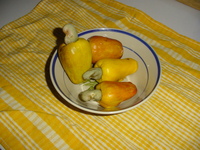
I saw them a lot in Abuja but the selection of fruit available in Kaduna isn’t usually so good. They’re a bit strange, sweet and fruity with so much juice it’s best to eat them outdoors but a sort of “dry” taste. The bit sticking out of the end contains the cashew nut, which is not edible raw and will cause nasty skin irritation.
Marion and I popped up to Zaria on Sunday to see some of the VSOs who are at the Theatre for Development workshop up there. A few of us then went into town for lunch and a stroll around the old city.
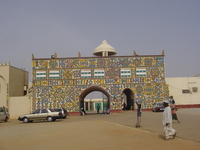
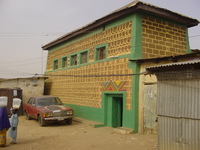
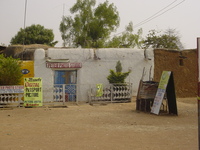
The traditional houses in Zaria often seem to be brightly painted, the Emir’s palace (on the left) was the first of these we saw. Strolling through the old city we came across several more in a similar style and also some traditional buildings with more modern uses.
There would have been more pictures but my camera has developed an intermittent fault. Sometimes it seems to be getting no signal from the image sensor, giving all-black pictures. I’m hoping it lasts for my remaining time in Nigeria.
Nentawe (a young guy working with local youth groups) invited us to the Kaduna premiere of a new film, The Imam and the Pastor. It’s a film about two religious leaders who, in their youth, belonged to religious militias in Kaduna but have since reconciled and joined to promote peace. Their organisation has its own web site: The Inter-Faith Mediation Centre.
It’s very well presented and interesting, a mixture of footage of the two going about their work and interviews about their past and present. There’s also some archive footage from the various clashes that they are working to present a recurrence of. The segment showing the mass graves at Yelwan Shendam is particularly powerful.
Afterwards there were to be questions and answers. This being Nigeria, instead we got speeches from the representatives of the various bigwigs who’d been invited but couldn’t be bothered to turn up. Finally, two questions were allowed. Both people asked if there were going to be more showings of the film, especially in schools.
It seems that the filmmakers are hoping for funding and support to translate the film into local languages and they also plan to show it internationally in other conflict areas.
I’m sitting in a car in the motor park in Bauchi, waiting for one more passenger before we can leave for Kaduna.
I spent the weekend at Yankari national park, we were lucky and actually saw some wildlife.
I’m writing this on my phone to pass the time sitting in the terrible heat.
Thessa organised a trip to Yankari, partly to celebrate her birthday and partly as a send-off for Pete and Mary.
Most of us met up in Bauchi motor park and then chartered a minibus to take us to Wikki camp, where the accommodation is. The journey wasn’t too bad, the park is currently being renovated and this includes surfacing the road from the entrance to Wikki. The accommodation and facilities are a bit run-down but we were lucky and managed to see quite a few animals.
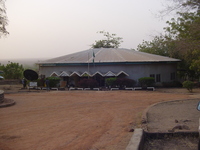
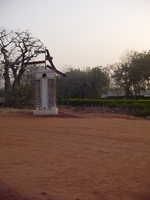
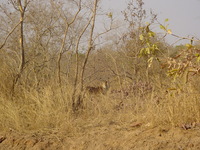
(more…)
On our way to spend the weekend in Yankari National Park Marion, Kristel and I spent the night at Siv’s place in Gindiri, Plateau State. He’s working at the College of Education there.
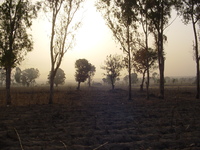
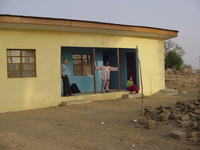
It’s a lovely place and he has a nice little house there. The college staff club has the best suya I’ve had in Nigeria.
My lovely IBM ThinkPad laptop seems to be dead, it suddenly turned off last night and won’t come back on.
This means that I’m temporarily without access to my saved emails and most of the rest of my personal stuff. I’m hoping the hard disk is still OK and I can get all the useful data off it but until then I won’t be checking my email very often.
Looks like it’s just as well I’m taking a holiday back to the UK in April, the laptop is still under warranty and I’d rather have IBM/Lenovo’s UK people deal with it than send my laptop to the “service provider” in Lagos.
Last year’s census is still causing arguments here, with all sorts of wild claims flying around. One of the big problems has been the announcement that Kano state has a slightly larger population than Lagos state, when obviously there are more people in Lagos!
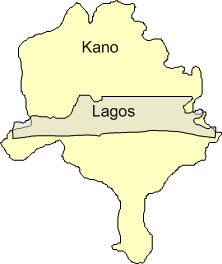
Chippla’s Weblog has a very sensible post on this subject, pointing out the difference in population density between the two states.
Quite apart from the organisational problems of the census, one of the major difficulties seems to have been the tendency for people to travel back to be counted in their hometowns. In some cases this was being organised and promoted by ethnic organisations, to ensure that their numbers would be high and to increase their share of Federal jobs and money. So cities with large non-indigenous populations emptied around census time and, as a result, will have been undercounted and will probably be under-resourced in future.
![[Nigeria]](/media/Flags/NGflagSmall.png)









